Israel-Hamas War: What happened on Day 98?
US, UK and allies attack Iran-backed Houthis • IDF discovers Khan Yunis tunnel where hostages were kept by Hamas • Israel appears at ICJ on genocide charge
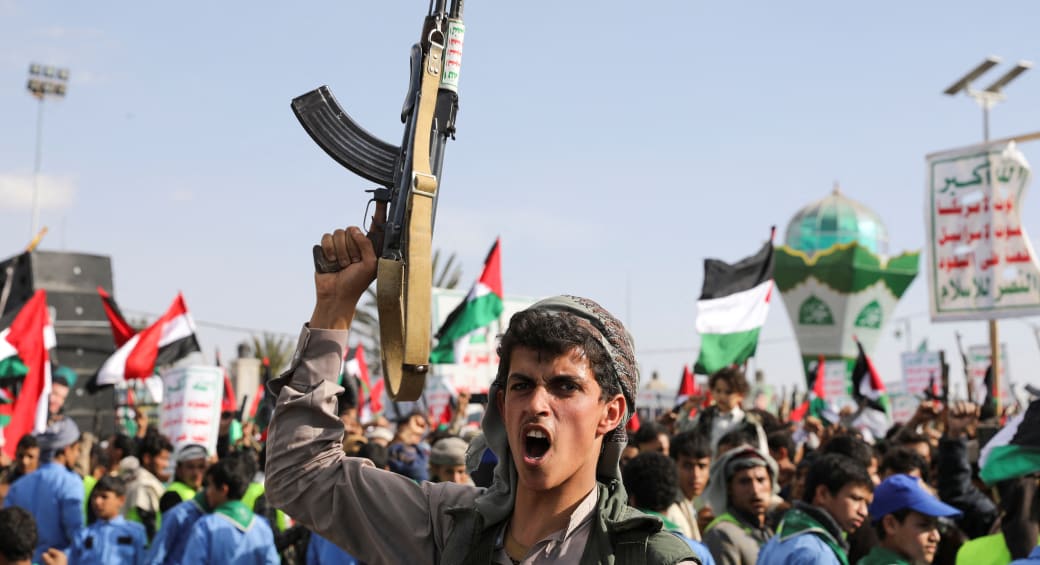

IDF destroys over 700 Hamas rocket launchers since start of the war
Many of the rocket launchers had been located by the IDF in schools and mosques.
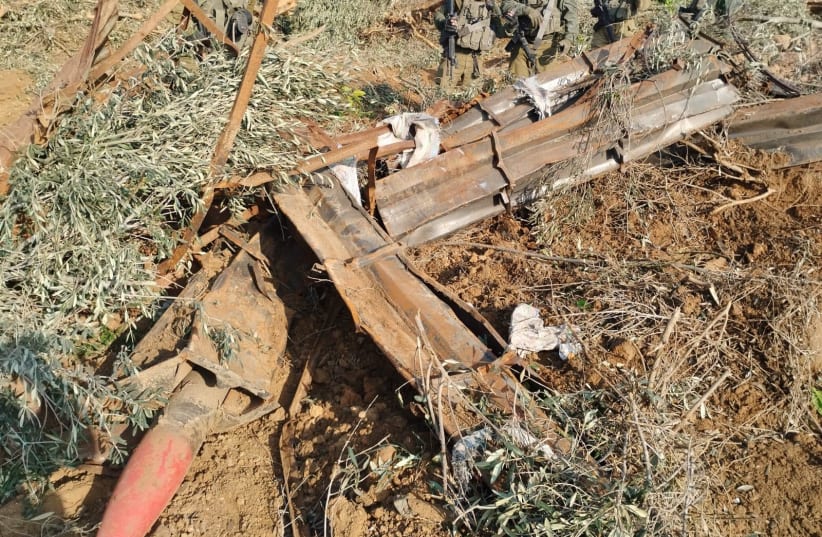
Over 700 of Hamas’s rocket launchers have been destroyed since the beginning of the war, the IDF announced on Friday afternoon. This has limited Hamas’s launching capabilities, the IDF said, which is expected to reduce risks to civilian populations in Israel.
Many of the rockets and launchers had been located and destroyed by IDF soldiers operating within the Gaza Strip and during targeted airstrikes.
Weapons in civilian areas
The 100th Squadron, during an aerial intelligence gathering mission, identified Hamas terrorists firing from within a school and a mosque in the Gaza Strip. The squadron neutralized the launchers in both locations.
Footage of the IAF airstrikes was subsequently released released.
In a similar situation, forces from the Golani Brigade located loaded and ready-to-launch rocket launchers that Hamas had stored within a cemetery. Again, the soldiers neutralized the weapons.
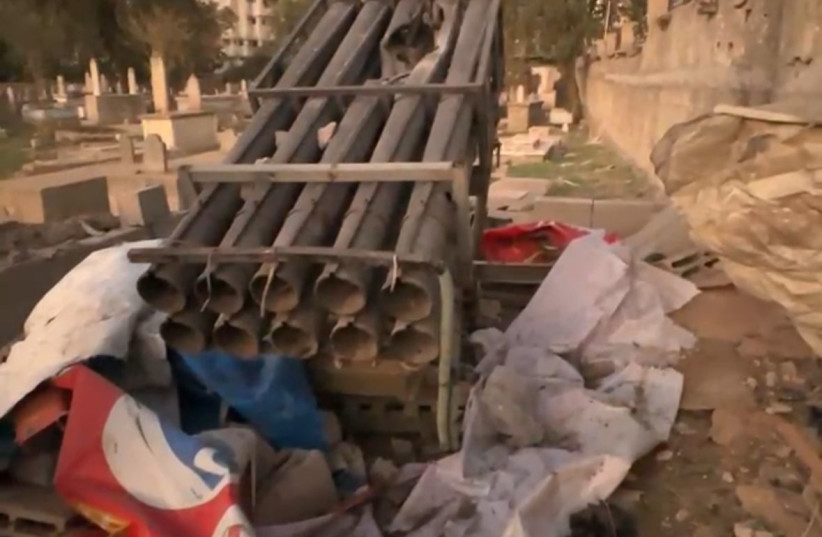
The IDF stressed that Hamas endangers both Israeli and Palestinian civilian lives by indiscriminately firing rockets at Israelis from rocket launchers located inside Gazan civilian buildings, including schools, mosques and residences. In past occasions, rockets launched by Hamas within the Strip have landed on civilian Palestinian populations.
In October, a misfired rocket launched by the Palestinian Islamic Jihad group landed on a hospital in Gaza, endangering the lives of Palestinian healthcare workers and patients. Similar misfires occurred in August when a PIJ rocket fell next to a clinic in Jabalya, killing two Palestinians.
Numerous groups, including Human Rights Watch and B'Tselem, have also in the past stated that Hamas's firing of rockets aimed indiscriminately at Israeli civilian populations is a war crime.
In a 2021 report, HRW said, "The rockets and mortars that Palestinian armed groups fired lack guidance systems and are prone to misfire, making them extremely inaccurate and thus inherently indiscriminate when directed toward areas with civilians. Launching such rockets to attack civilian areas is a war crime.
"Hamas authorities should stop trying to justify unlawful rocket attacks that indiscriminately kill and injure civilians by pointing to Israel's violations," Eric Goldstein, HRW acting Middle East and North Africa director, said at the time, according to the BBC. "The laws of war are meant to protect all civilians from harm."
Reuters and Tzvi Joffree contributed to this report.
Go to the full article >>Lebanon's Hezbollah condemns US-Britain strike on Houthis in Yemen

Lebanon's Hezbollah said on Friday it condemns the US-Britain attack on the Houthis.
The Iran-aligned group added, "The American aggression confirms once again that the US is a full partner in the tragedies and massacres committed by the Zionist enemy in Gaza and the region," it said in a statement.
Go to the full article >>IDF releases report on humanitarian aid to Gaza
The operation is complex logistically, requiring cross-border coordination and a joint effort between Israel, the United States, Egypt, and the UN.
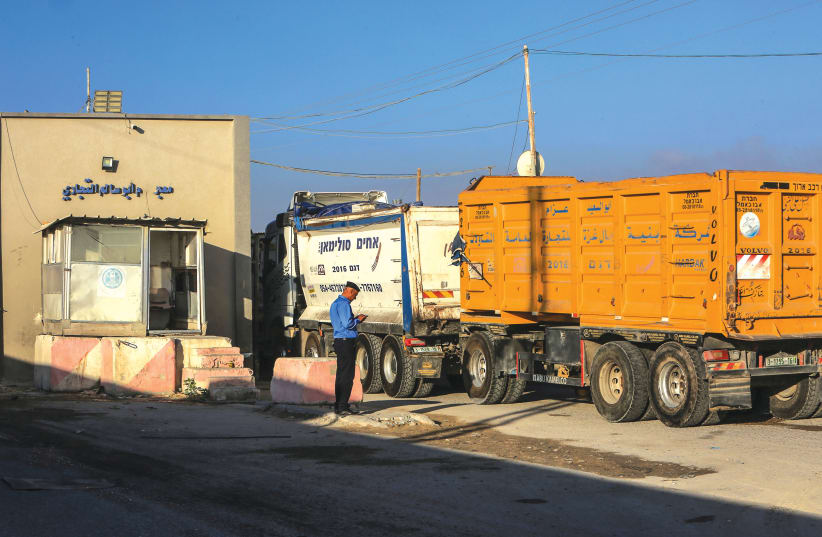
The IDF released a detailed report on Friday regarding the humanitarian aid it is providing to Gaza.
The operation is complex logistically, requiring cross-border coordination and a joint effort between Israel, the United States, Egypt, and the UN.
"The war against Hamas is a fight for Israel's right to exist in peace, for Western values, and freedom from brutal terrorism against both Israelis and Gazans," the statement said.
"Israel is going to extreme lengths to mitigate harm to civilians and is calling on the international community to increase humanitarian aid being sent to Gaza," it continued.
It concluded on a final note, "Israel is fully committed to facilitating and supporting all humanitarian efforts by the international community while working to free the Israeli hostages, dismantle Hamas, and bring hope for a better future for the people of the Middle East."
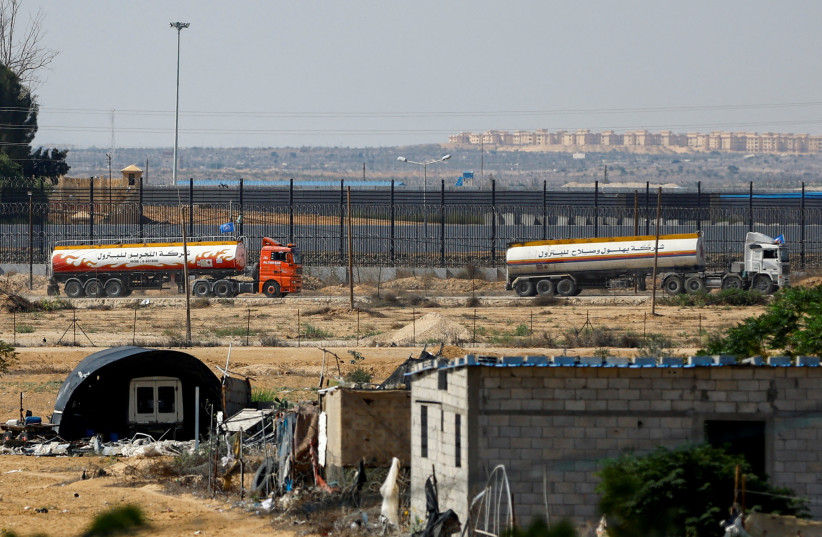
How the aid gets into Gaza
The convoy undergoes double inspection. From the Egyptian port of Al-Arish, the aid is first delivered to the Rafah border crossing, where Egyptian officials search only to be followed by a stop at the Nitsana or Kerem Shalom crossings for Israeli inspection.
Solely then can the goods be returned to the Rafah border and dispatched to Gaza.
The humanitarian aid allowed into Gaza
According to the IDF, the joint effort led to a surge of 1000% in daily aid volume, feeding more than half a million people daily.
Along with food, fresh water is delivered on a daily basis, along with fuel destined for the distillation plants. Regarding the two Israeli pipelines that Hamas damaged on October 7, these are now operational. In addition, water runs through a recently built Emirati pipeline, which enables the daily flow of 33 million liters of fresh water, the statement said.
There are four large operational field hospitals in Gaza, which supply medical aid. These are supported by two medical ships docked at the Egyptian Al-Arish port, enabling staff rotation, the IDF stated.
Israel also allows international medical teams to enter Gaza and enables patients to be evacuated when the need arises.
The military also expounded upon the various shelter equipment that has entered the Strip, which includes tents, mattresses, blankets, and diverse hygiene products.
The report comes amid South Africa's case against Israel at the ICJ which accuses Israel of committing genocide.
Go to the full article >>US, allies strike Houthis in Yemen
These are believed to be the first strikes the United States has carried out against the Houthis in Yemen since 2016.
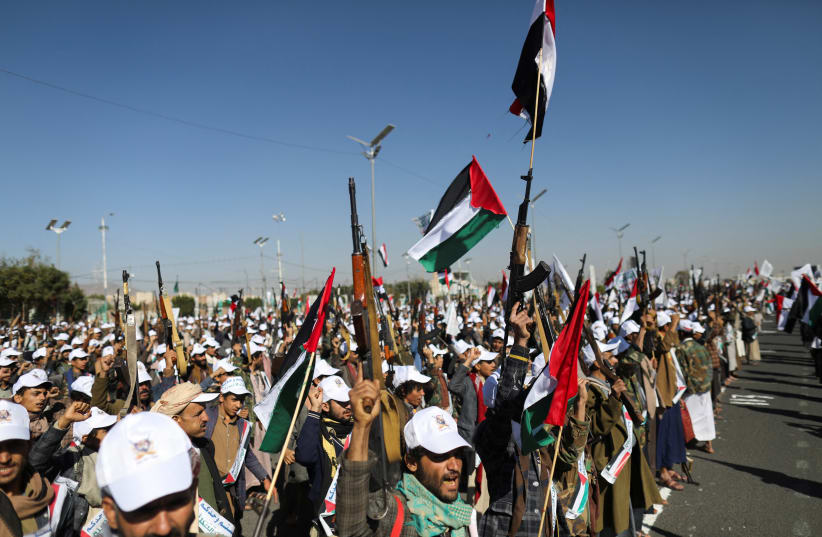
The United States and United Kingdom struck targets in Yemen connected to the Iranian-backed Houthi rebel group Thursday night, with support from Australia, Bahrain, Canada, and the Netherlands. Reports of the attacks appeared at about 01:00 Israel time, and the US and UK governments acknowledged the attacks about two hours later.
It is believed to be the first time strikes have been launched against the Iran-backed group since it started targeting international shipping in the Red Sea late last year.
The Houthis, who control most of Yemen, have been targeting Red Sea shipping routes to show their support for Hamas. The attacks have disrupted international commerce on the key route between Europe and Asia that accounts for about 15% of the world's shipping traffic.
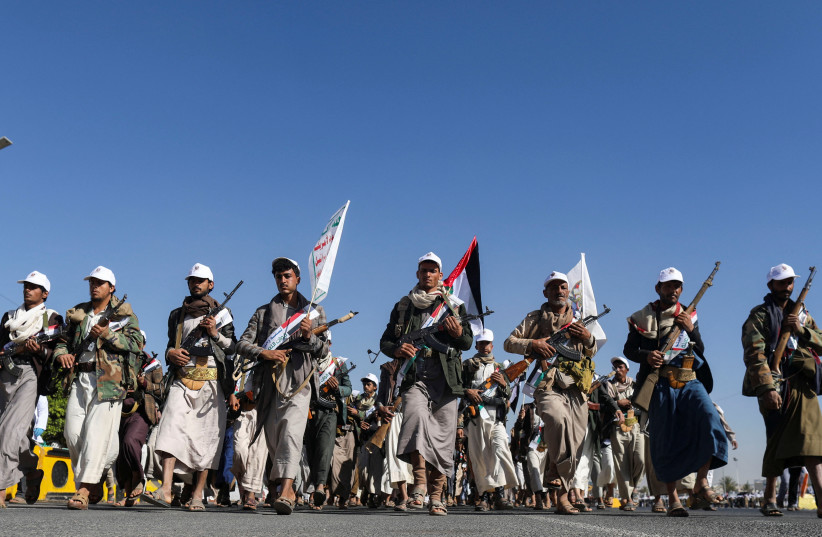
Houthi leader vowed a response to any US attack
Earlier on Thursday, the Houthi's leader said any US attack on the group would not go without a response.
The Houthis, who seized much of Yemen in a civil war, have vowed to attack ships linked to Israel or bound for Israeli ports. However, many of the targeted ships have had no links to Israel.
The US military said on Thursday Houthis fired an anti-ship ballistic missile into international shipping lanes in the Gulf of Aden, the 27th attack by the group since Nov. 19.
Go to the full article >>US, UK and allies act to deter Houthis - analysis
There will be many questions in coming days about whether these strikes were successful and whether the Houthis will be deterred.
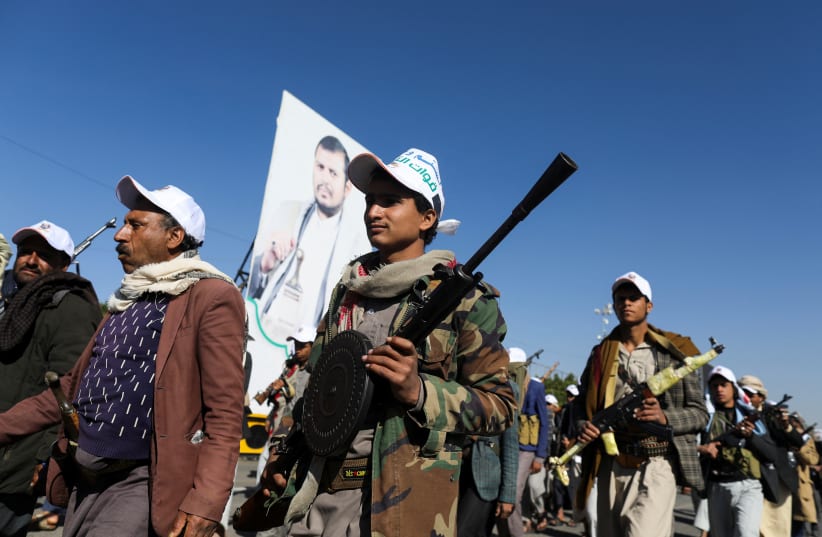
The US and UK, along with other allies have acted to deter the continued Iran-backed Houthi attacks on shipping in the Red Sea. The Houthi group in Yemen have systematically increased their attacks and escalated their threats against international shipping. They initially began in October to try to target Israel with drones and missiles. Then they shifted to trying to blockade Israel by claiming to target commercial ships linked to Israel. Then they expanded their attacks to include many ships and threatened US, UK and French naval ships.
The White House said on January 11 that together with the UK, and with support from Australia, Bahrain, Canada and the Netherlands, the US targeted the Houthis in Yemen. The US says these attacks struck a number of targets. The attacks are a response to almost thirty attacks by the Houthis targeting ships in the Red Sea. Many of these attacks have involved numerous drones and missiles and have threatened dozens of ships.
The US Navy, along with the British and French navy, have helped to intercept attacks. The US also launched Prosperity Guardian, a task force of various navies, to help stop these attacks last month. So far the Houthis have continued to act with impunity. They have even used small boats to harass ships and the US sank several small boats recently.
There will be many questions in coming days about whether these strikes were successful and whether the Houthis will be deterred. It is in Iran’s interest to continue to escalate tensions in the region. Iran backs the Houthis and has been closely involved in trying to bring the Houthis into the regional conflict which Hamas began on October 7.
The Houthis are one element the Iranians use alongside Hezbollah, Hamas, Palestinian Islamic Jihad, militias in Syria, as well as Iran-backed militias in Iraq, in a multi-front conflict targeting Israel and the US. Iran has sought to exploit the Hamas attack on October 7 to create a regional conflict. Iran’s goal in this war is to reduce US influence in the region, sabotage further normalization agreements between Israel and other countries in the region, and also to bring Hamas to prominence in the West Bank so it can supplant the Palestinian Authority.

It took two months to take the Houthi threat seriously
Iran has used the Houthis to attack shipping in an unprecedented campaign against shipping in the Red Sea. The Red Sea is a strategic shipping lane and some shipping companies have called off shipping via this route and Suez to Europe, forcing ships to take the longer and more arduous route around the Cape of Good Hope in South Africa.
It took two months to take the Houthi threats seriously. While the threats began in October, it was not initially clear whether they would escalate or continue to lob a few drones and missiles toward Eilat, to show that they could. The Houthis initially wanted to show support for Hamas but they weren’t sure how much they wanted to get involved. The Iranians have helped arm the Houthis since at least 2015 when the group tried to take over Yemen. At the time the Saudis intervened in Yemen to try to stop them taking Aden.
Riyadh was initially successful backing the Yemen government against the Houthis. However, Saudi Arabia and its partners got bogged down in Yemen. Eventually a ceasefire was put into place recently in Yemen and China helped broker normalization between Saudi Arabia and Iran. This means Saudi Arabia was reticent to see new escalation in the Red Sea. But the Houthis moved forward anyway, prodded by Iran. Iran had already sent Shahed 136 drones to Yemen in late 2020, the same drones Iran exported to Russia for Moscow’s war in Ukraine. This matters because Iran sees the Houthis as a proxy and test bed. They use the Houthis to attack ships as one of the many Iranian tentacles in the region.
Now the US, UK and others have helped to strike back and hopefully deter more aggression. The countries involved are important. Bahrain is the sole regional country but it likely has support from some neighbors. The US and UK have often participated in regional conflicts together, such as on Iraq policy in the 1990s and 2000s. Canada and Australia likely supported the strikes in part because they are part of the Five Eyes network of countries, which includes the US, UK and New Zealand. All these countries are major economies that care about the freedom of the seas and international shipping. Now a line has been drawn in the Red Sea. The question is whether the Houthis will continue to cross it.
Go to the full article >>Talks underway to deliver medicine to hostages - report
136 Israeli hostages have been held in Gaza for almost 100 days, many with chronic diseases. Their conditions are deteriorating due to the harsh circumstances of their captivity.
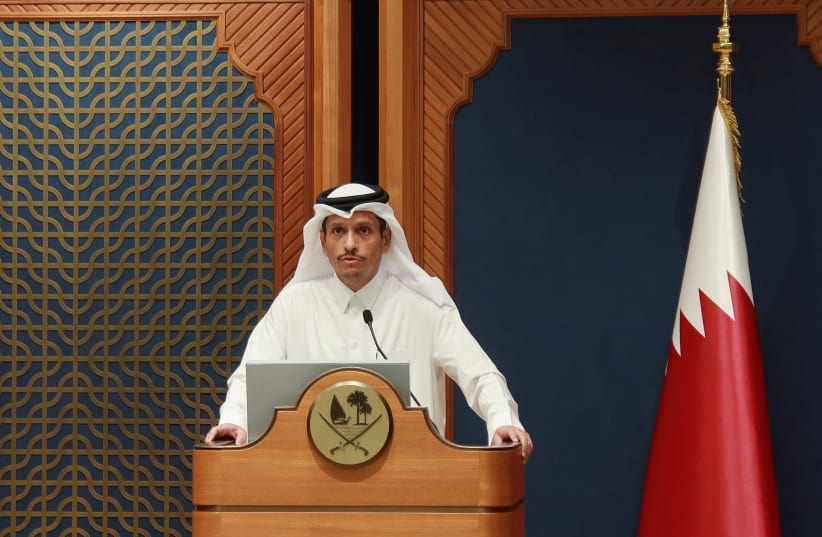
Qatar is in talks with Hamas to enable the delivery of medications to the Israeli hostages held in Gaza, the New York Times reported on Thursday. In parallel, Qatar, acting as a mediator between the Jewish state and Hamas, is negotiating with Israel to enable the entry of medicine to Palestinians in Gaza. This will be facilitated by various international organizations.
An anonymous Israeli official involved in the details of the talks said that progress had been made, the report claimed.
Relatives of hostages meet with Qatari premier
This comes as family members of Gaza hostages met in Doha with Qatari Prime Minister Mohammed bin Abdulrahman bin Jassim Al Thani to discuss the delivery of medication to their relatives in the Strip, the New York Times further stated.
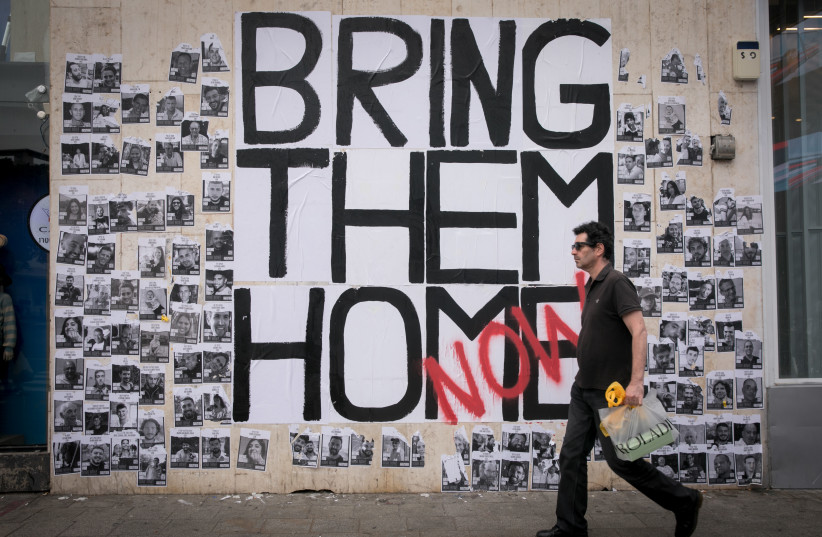
Harsh captivity conditions
136 Israeli hostages have been held in Gaza for almost 100 days, many with chronic diseases, such as asthma, diabetes, nearsightedness, hypertension, allergies, irritable bowel syndrome, and endocrine disease. Due to the harsh circumstances in which they are detained, their conditions have considerably deteriorated. In addition, for many, the lack of appropriate medication can lead to the development of severe, life-threatening disorders.
The Red Cross has been unable to reach the hostages and grant them the medical assistance they need.
Dr. Itai Gil contributed to this article.
Go to the full article >>Palestinian statehood best way to marginalize Iran - Blinken says
Speaking to reporters after meeting Egyptian President Abdel Fattah al-Sisi, Blinken said Middle East is currently facing two different paths.
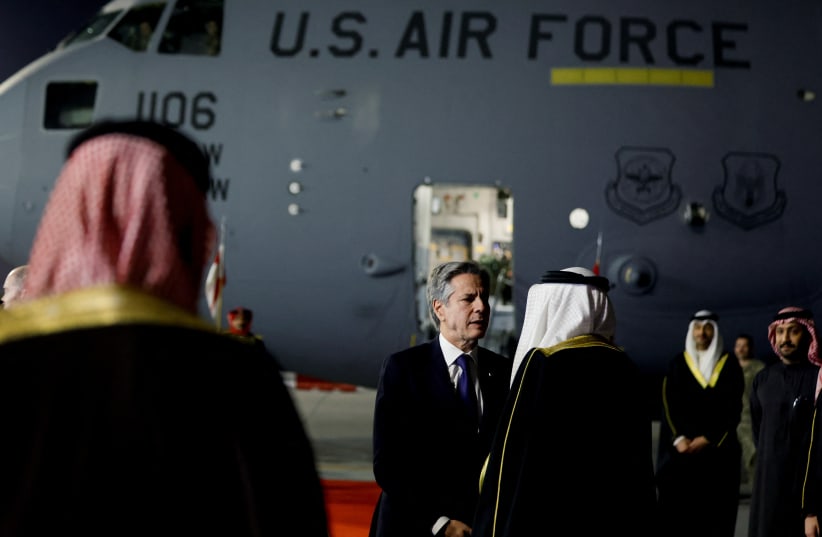
The best way for Israel to normalize regional ties and isolate Iran is to agree to finalize a two-state resolution to the conflict, US Secretary of State Antony Blinken told reporters in Egypt on Thursday.
“I think you can really see two very stark alternatives for the region,” Blinken said after meeting with President Abdel Fattah el-Sisi.
He spoke in Cairo as he wrapped up a week-long trip that also included visits with top officials in Turkey, Greece, Jordan, Qatar, Saudi Arabia, Israel, the West Bank, and Bahrain.
Blinken’s focus was on immediate threats from Iranian proxies, such as Hamas in Gaza, Hezbollah in Lebanon, and the Houthis in Yemen. He linked, however, his focus on preventing the Hamas war from spilling over onto other fronts, with the creation of a Palestinian state as an antidote to regional violence and a necessary component of any Israeli normalization efforts.
One can “have an integrated region with Israel – integrated with security assurances and commitments from regional countries, as well from the United States – and a Palestinian state,” Blinken said, or one can “continue to see the terrorism, the nihilism, the destruction by Hamas, by the Houthis, by Hezbollah – all backed by Iran,” he explained.
“If you build that integration, if you bring Israel in, if you make the necessary commitments to security, and you move down the path to a Palestinian state, that’s the single best way to isolate, to marginalize Iran and the proxies,” Blinken said.
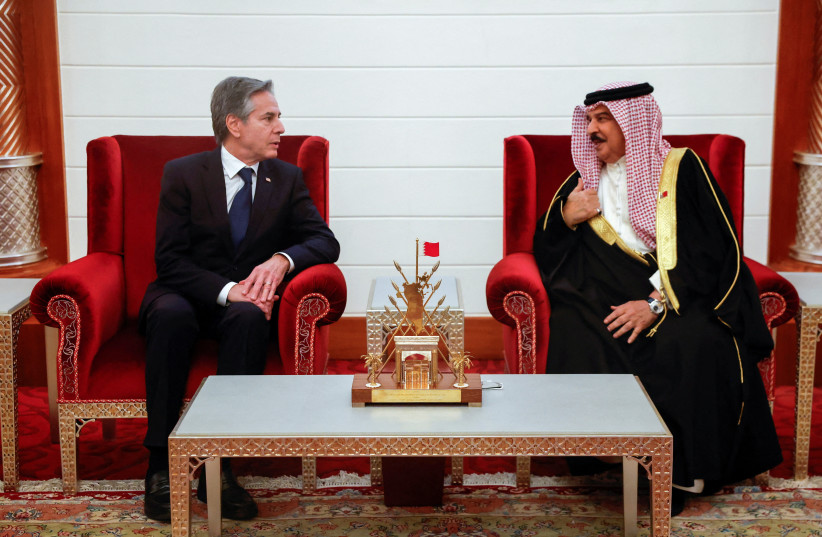
The choice between these two paths is clear to many leaders in the region, said Blinken. It’s also the path that “we fully intend to pursue with American diplomacy in the weeks and months ahead,” he added.
During his trip, however, he focused on the details specific to the Hamas war, sparked by the Islamist Hamas-led October 7 infiltration of southern Israel in which more than 1,200 people were massacred and some 250 seized as hostages.
Blinken backed Israel’s military campaign to oust Hamas from Gaza and emphasized the significance of ensuring its security. He emphasized the importance of freeing the hostages and spoke of the US work on that effort with Egypt and Qatar, which are mediating release efforts.
Blinken, however, also took issue with the high fatality count in Gaza, based on Hamas assertions that over 23,000 Palestinians have been killed in war-related violence. That casualty figure, however, is supplied by the Hamas-run Health Ministry, which does not differentiate between terrorists and civilians killed. Israel has asserted that it has killed more than 8,000 Hamas combatants in Gaza.
Preventing civilian deaths in Gaza
During Blinken’s visit to Israel, he spoke about the importance of preventing civilian deaths in Gaza and of transitioning the IDF’s military campaign from a high- to a low-intensity one. He spoke with officials about ways to increase the passage of goods into Gaza and the necessity of creating a deconfliction mechanism to distribute those goods.
Most of the Palestinians in Gaza have fled their homes due to the war, and their plight was also on Blinken’s agenda. He rejected calls by right-wing Israeli ministers for the voluntary displacement of Palestinians, insisting that they must be able to return home, particularly those from the northern part of the enclave.
“We come away with a number of concrete steps forward,” Blinken said as he pointed to an agreement with the UN, by which it would send an assessment team to north Gaza to see what steps are necessary for Palestinian civilians to return.
During his meeting with Palestinian officials in Ramallah, Blinken said, he received “a commitment from the Palestinian Authority to pursue meaningful reform,” but he did not specify what reforms he was mentioning.
Day After plans for Gaza were also a “big part” of his conversations in the region, Blinken said. “Israel is fighting Hamas terrorists, not the Palestinian population, and we are doing so in full compliance with international law,” he stated.
On Wednesday night, Prime Minister Benjamin Netanyahu clarified “that Israel has no intention of permanently occupying Gaza or displacing its civilian population.
“Israel is fighting Hamas terrorists, not the Palestinian population, and we are doing so in full compliance with international law,” he stated.
“Our goal is to rid Gaza of Hamas terrorists and free our hostages. Once this is achieved, Gaza can be demilitarized and deradicalized, thereby creating a possibility for a better future for Israelis and Palestinians alike,” Netanyahu stressed.
Go to the full article >>Gallant: Israel is fighting the most justified war, IDF makes gradual progress in Khan Yunis
IDF makes gradual progress in Khan Yunis tunnels • Tensions with Hezbollah lessen somewhat
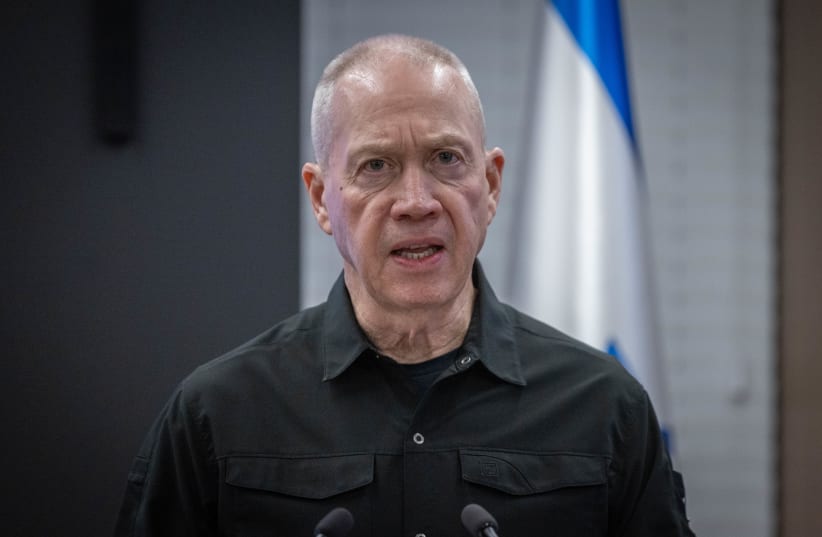
Defense Minister Yoav Gallant on Thursday told IDF troops during a visit to southern Gaza, “There is no war that is more justified than the one we are fighting.”
“We distinguish between the civilian population and the terrorists, every last one of whom we will track down,” he said in the shadow of the genocide hearing at the International Court of Justice.
Despite some people who think the IDF has lost its drive to finish off Hamas, there is still intense activity against the terrorist group in southern Gaza, Gallant said.
The IDF has had operational control of northern Gaza for a few weeks, so the fighting there has significantly slowed.
The IDF on Thursday presented new video footage of a vast subterranean tunnel complex built by Hamas under Khan Yunis. Located by the Commando Unit, the Yahalom Combat Engineering Unit, and Special Forces units, the tunnel complex was connected to an extensive underground tunnel network across the entire city.
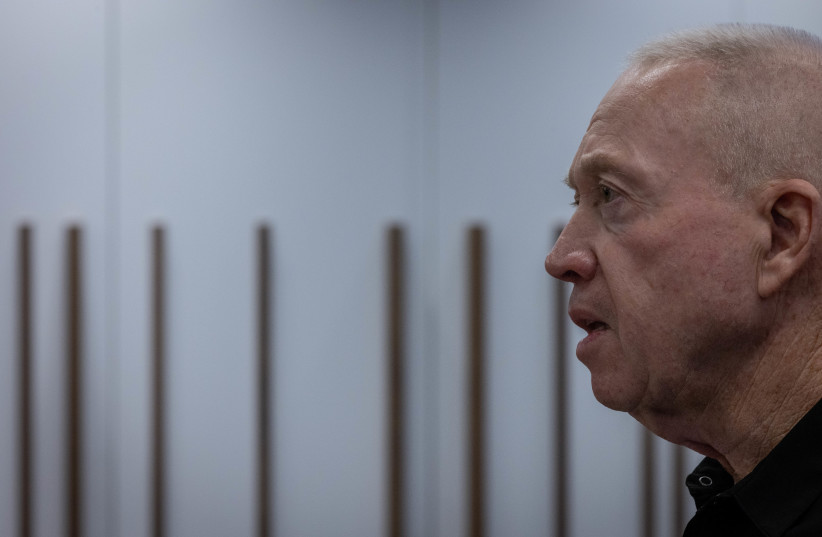
After investigating the tunnel, the IDF confirmed that Israeli hostages had been inside it.
Millions of shekels are estimated to have been invested in excavating the tunnel and equipping it with air ventilation systems, electricity, and plumbing.
The IDF’s 98th Division is simultaneously fighting underground and above ground in urban areas to locate and destroy tunnels, using advanced technology, explosives, and other means.
Hundreds of tunnel shafts uncovered
Recently in Khan Yunis, IDF forces located more than 300 tunnel shafts, some leading to significant tunnels, tactical shafts, and underground areas, which are used as weapons storage facilities and combat areas.
Artillery and IAF units had undertaken 1,300 attacks in Khan Yunis and eliminated 50% of the 150 tunnel shafts they found there, Brig.-Gen. Dan Goldfus, commander of the 98th Paratroopers Division, told a closed media briefing on December 21.
This means that in the approximately 20 days since then, the IDF found an additional 150 shafts.
While this is certainly progress, as of December 10, including mostly numbers from northern Gaza, the IDF has destroyed more than 1,500 tunnel shafts. This suggests that the IDF still has a long way to go in Khan Yunis, which Goldfus and other senior officers and defense officials have said.
The IDF also described some other specific operations in the Al-Maghazi refugee camp and Khan Yunis in southern Gaza.
In one operation, Golani soldiers identified an armed terrorist cell that was exiting a tunnel. The IDF located the terrorists using aerial surveillance, and they were eliminated with an airstrike.
The three terrorists exiting the tunnel were carrying AK-47s, the IDF said. In the operation, soldiers located weapons in the family home of one of the terrorists.
In another operation in the area of Al-Maghazi, troops identified eight terrorists who were heading in the direction of a school known to be used for terrorist activities. The terrorists were killed by sniper fire.
In the area of Khan Yunis, soldiers identified three other terrorists exiting a compound filled with weapons. They also were eliminated in an airstrike.
Also in Khan Yunis, soldiers identified two terrorists planting an explosive device in the ground and killed them on the spot.
Later, two more terrorists were identified entering a compound. One went up on a rooftop to carry out surveillance of soldiers. Both terrorists were killed in airstrikes.
In another operation in Khan Yunis, following anti-tank missiles fired at soldiers, the troops struck the terrorist infrastructure from which the missiles were fired.
Late Thursday, Palestinian media reports said the IDF had carried out a targeted killing against a vehicle of Palestinians, leading to eight dead.
Despite some rumors that the attack might have eliminated a senior Hamas official, as of press time, no top official had been killed, IDF sources said.
Meanwhile, in the North, the IDF said about 10 rockets were fired from Lebanon at Kiryat Shmona and Margaliot. An Iron Dome battery shot down three, and the others landing harmlessly.
Hezbollah fired several other rockets at other areas in the North.
The IDF responded with airstrikes and artillery against both the Hezbollah sources of fire and against additional positions and infrastructure of the Lebanese terrorist group.
According to Lebanese media, Hezbollah said it had initiated certain attacks to respond to IDF strikes on two Hezbollah rescue personnel and their ambulance.
As of press time, the IDF had not issued any specific statement about anyone other than Hezbollah terrorists.
While all of this military activity was more than on Wednesday, it was still less when compared with the past two weeks.
The only rocket sirens in the South were from rockets fired by Hamas at Kissufim in the morning. No damage was reported.
Go to the full article >>IDF discovers Khan Yunis tunnel where hostages were kept by Hamas
Several terrorist cells were discovered and eliminated throughout operations in Khan Younis and Al-Maghazi.
IDF troops discovered a vast subterranean tunnel complex built by Hamas under Khan Yunis on Wednesday, the IDF announced. Located by the Commando Unit, the Yahalom Combat Engineering Unit, and Special Forces units, the tunnel was connected to an extensive underground tunnel network beneath a civilian area in the city.
After investigating the tunnel, the IDF confirmed that Israeli hostages had been inside the tunnel. Millions of shekels are estimated to have been invested in excavating the tunnel and equipping it with air ventilation systems, electrical supply, and plumbing.
The IDF's 98th Division is simultaneously fighting underground and above ground in urban areas in the city. Engineering forces, the Yahalom Unit, special forces units and additional troops are leading the effort to locate tunnels, investigate and dismantle them with advanced technology and operational means.
During underground combat, the forces located more than 300 tunnel shafts, some leading to significant tunnels, tactical shafts, and underground areas, which are used as weapons storage facilities and combat areas.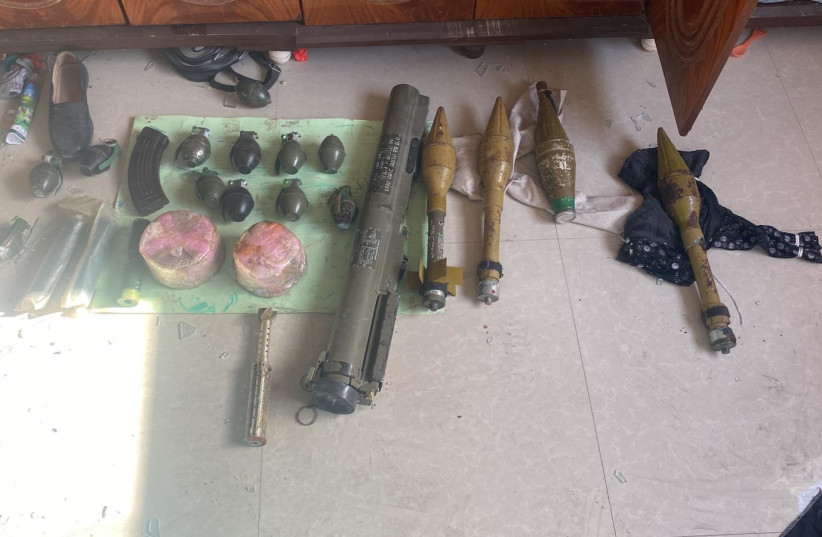
As IDF soldiers continued operations in central Gaza, several terrorists were identified and killed by air strikes and live fire in the region on Wednesday, the IDF spokesperson unit reported.
According to the statement, the IDF carried out intense operations in Al-Maghazi and Khan Yunis on Wednesday.
In one operation, Golani soldiers identified an armed terrorist cell and eliminated it as the terrorists were exiting a tunnel. The IDF located them using aerial surveillance and were eliminated with an airstrike.
Weapons were found in the family home of a terrorist
The three terrorists exiting the tunnel were carrying AK-47s. In the operation, the IDF soldiers located weapons in the family home of one of the terrorists.
In another operation in the area of Al-Maghazi, troops identified eight terrorists who were heading in the direction of a school known to be used for terrorist activities. These terrorists were killed by precise sniper fire.
In the area of Khan Yunis, IDF troops identified three terrorists exiting a compound filled with weapons. This terrorist cell was eliminated using an airstrike.
Also in Khan Yunis, IDF soldiers identified two terrorists placing an explosive device on the ground, and killed them on the spot.
Later on, two more terrorists were identified entering a compound. One went up on a rooftop in order to scout IDF troops. Both terrorists were killed in airstrikes.
In another operation in Khan Yunis, following anti-tank missiles fired at IDF troops, the troops struck the terrorist infrastructure from which the missiles were fired.
Go to the full article >>The first day at the International Court of Justice: South Africa lays out its case
The South African complaint is the first time Israel has faced genocide accusations at ICJ.
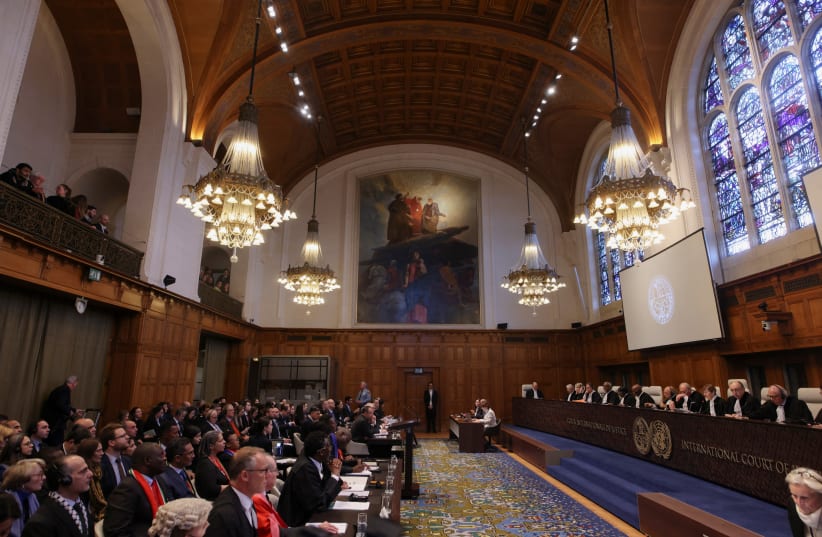
The Hague, Netherlands — South Africa pressed the International Court of Justice to demand a complete ceasefire in Gaza and to find Israel guilty of genocide during the opening of a two-day contentious and historic hearing at The Hague.
“No attack, however serious, can justify breaches to the [genocide] convention whether as a matter of law or morality,” South Africa’s Justice Minister Roland Lamola told the court, as he argued that Israel planned to eliminate all Palestinians in Hamas ruled Gaza.
Lamola said that the attack by Hamas on Oct. 7 did not justifies Israel’s military campaign in Gaza, stating that “no attack, however serious, can justify breaches to the [genocide] convention whether as a matter of law or morality.”
The Justice Minister arrived in the Netherlands for Thursday morning’s presentation of South Africa’s complaint that Israel was in violation of the 1948 Convention on the Prevention of Genocide. Israel and south Africa are both signatory on the convention, which means that in principle, Israel accepts the authority of the court.
In addressing the court South African attorney Tembeka Ngcukaitobi charged that ‘’Israel has a genocidal intent against the Palestinians in Gaza, adding that “Israel’s political leaders, military commanders and persons holding official positions have systematically and in explicit terms declared their genocidal intent.”
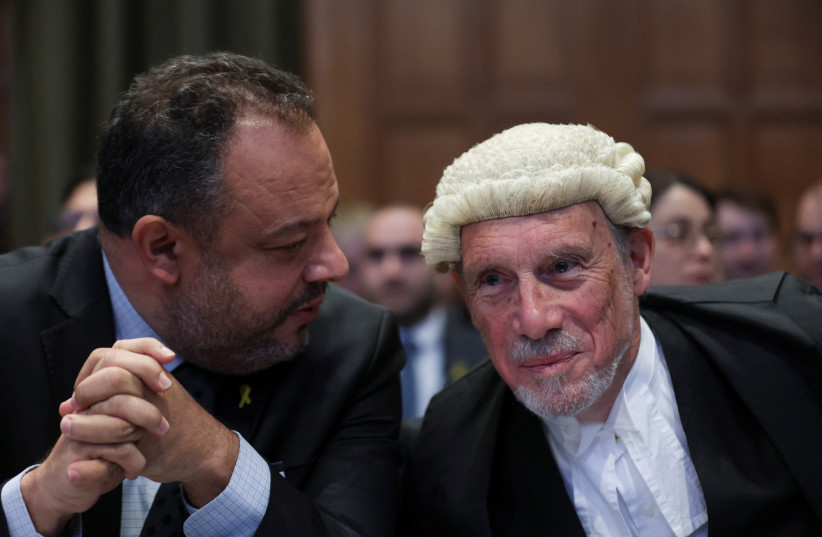
Israel challenged for the first time at the ICJ
The South African complaint is the first time Israel has faced genocide accusations at ICJ. The court had set up two consecutive three-hour hearings on the complaint. South Africa went first, on Thursday, with Israel set to present its arguments Friday morning. Stakes for Israel are high, as the court could, at a first stage, order Israel to stop the war, and then at a second stage, find Israel guilty of genocide.
The hearing on Thursday in the Hague has drawn international attention, with more than one hundred journalists allowed, unprecedently, into the ‘’Peace Palace’’ court building. Additional dozens of tv crews arrived to the Dutch capital to cover the case, and also to cover demonstrations, for and against Israel, staged in the vicinity of the court. The chilling weather did not deter thousands of demonstrators from across the Netherlands and even from other European countries to arrive to the place.
Demonstrators is support of Israel marched near the ICJ carrying pictures of hostages or of Israelis killed on Oct. 7. Family members of hostages held in Gaza lead the rally, calling on world leaders not to forget the necessity of liberating their loved ones. The march was halted by police for several long minutes, after pro-Palestinian activists tried to interfere, shouting anti-Israeli slogans. According to Israel’s foreign ministry, the activists breached the conditions set by the local police, designed to keep the Israeli march and the pro-Palestinian demonstration nearby apart.
Inside the court house, tensions were palpable. The Israeli and South African teams each received a room for consultations, far apart, never crossing each other’s path. The South African legal team, wearing either scarfs with the colors of their flag or keffiyeh scarfs, was joined by several Palestinian militants, including representatives of the Palestinian diplomatic mission in the country.
The team was also joined by far-left European politicians such as French Jean-Luc Mélenchon and former leader of the British Labor party Jeremy Corbyn. With the south African legal team using multiple pictures and videos for their presentation, the court room felt more like a political rally than a judicial hearing.
The difference in style was noticeable also when the hearing ended, with the south Africans staging a press conference together with Palestinian officials on the steps of the court. The Israeli team opted for a press conference later in the day, at a Jewish center in the city, where speakers were first and foremost families of hostages held in Gaza.
What is South Africa seeking?
The South African complaint submitted to the court on Dec. 29 seeks two goals. The first, a more long-term goal, is for the ICJ to recognize that Israel has been carrying out a genocide against Gaza Palestinians. The second, for the short run, is for the court to issue provisional measures, calling on Israel to stop its military occupation in Gaza, to enable external bodies to examine the situation on the ground and to enable unimpeded humanitarian assistance to the Strip.
For the ICJ to issue these provisional measures, South Africa does not need the court to recognize a genocide by Israel. What is does need is for the court to recognize plausible risk for genocidal acts against Gaza residents. Such a decision, say experts, could be issued in a matter of days.
Dr. Adila Hassim, who presented what South Africa titled the ‘’genocidal acts’’ chapter, showed photos of mass graves in Gaza with bodies buried in linens and plastic bags and videos of buildings destroyed by bombing, describing Israel’s alleged ‘'unparalleled and unprecedented killing'’ of Palestinians.
The ’’genocidal act’’ part was followed by the ‘’genocidal intent’’ chapter, presented by Tembeka Ngcukaiobi. The South Africa lawyer claimed that Israeli elected and top officials have made statements calling for the elimination of the Gazan population. Israeli soldiers, he said, have been making similar calls, reflecting how the inciting rhetoric by the leaders inspired and encouraged killings on the ground.
In an attempt to prove his point, Ngcukitobi referred to a statement made by prime Minister Benjamin Netanyahu Oct. 28, on the eve of the ground offensive, when he said positioned Hamas as an iteration of the biblical Amalek. Quoting Deuteronomy 25:17, Netanyahu said, “You must remember what Amalek did to you.” For Ngcukitobi, that meant calling on Israeli soldiers to combat all of the Palestinian people in Gaza, not just Hamas.
On the same issue, Ngcukitobi showed a video of Israeli soldiers dancing while singing ‘’it’s a blessing to kill the descendants of Amalek,’’ and, ‘’there is no such thing as uninvolved’’ civilians.
Arguing that for Israel’s leadership the enemy is not just the Hamas military branch or the organization of Hamas, but all of the Gaza population, the south African lawyer quoted comments made by President Isaac Herzog Oct. 13 - “It is an entire nation out there that is responsible. It is not true this rhetoric about civilians not being aware, not involved. It’s absolutely not true. They could have risen up. They could have fought against that evil regime which took over Gaza in a coup d’etat.”
Another quote used by South Africa was one made by Defense Minister Yoav Gallant, who said on Oct. 9, “I have ordered a complete siege on the Gaza Strip. There will be no electricity, no food, no fuel, everything is closed. We are fighting human animals and we are acting accordingly.” In the same vein, Ngcukaiobi quoted COGAT, who had said “Human animals must be treated as such. There will be no electricity and no water [in Gaza], there will only be destruction. You wanted hell, you will get hell.”
Prof Vaughan Lowe, who addressed specifically the provisional measures requested by South Africa, argued that ‘’Hamas is not a state and cannot be party to the [genocide] convention, and cannot be party to these proceedings. Other bodies could address the question of past atrocities.’’ He also said that Israeli authorities have done ‘’practically nothing’’ to stop the rhetoric of incitement, criticizing what he described as ‘’Israel’s inability to see it has done something wrong, in grinding Gaza and its people into the dust.’’
Israel slams South Africa, for ‘representing Hamas’
Israeli Foreign Ministry Spokesperson Lior Haiat, also in the Hague for the hearings, issued a written statement after the hearing, saying ‘’today we were witness to one of the greatest shows of hypocrisy in history, compounded by a series of false and baseless claims. South Africa, which is functioning as the legal arm of the Hamas terrorist organization, utterly distorted the reality in Gaza following the Oct. 7 massacre and completely ignored the fact that Hamas terrorists infiltrated Israel, murdered, executed, massacred, raped and abducted Israeli citizens, simply because they were Israelis, in an attempt to carry out genocide.’’
Qualifying South Africa as representing Hamas, Haiat added that ‘’South Africa seeks to allow Hamas to return to commit the war crimes, crimes against humanity and sexual crimes they committed repeatedly on Oct. 7, as its leaders have stated.’’
Go to the full article >>Israel-Hamas War: What you need to know
- Hamas launched a massive attack on October 7, with thousands of terrorists infiltrating from the Gaza border and taking some 240 hostages into Gaza
- Over 1,200 Israelis and foreign nationals were murdered, including over 350 in the Re'im music festival and hundreds of Israeli civilians across Gaza border communities